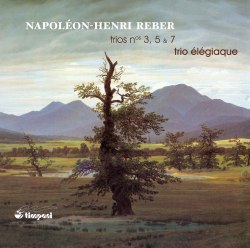| 
|
Napoléon-Henri REBER (1807-1880)
Piano Trio No. 3 in G minor, Op. 16 (1862) [30:14]
Piano Trio No. 5 in C, Op. 30 (1872) [17:37]
Piano Trio No. 7 in A minor, Op. 37 (1880) [25:05]
Trio Élégiaque
rec. Coeur de Ville, Vincennes, December 2012
TIMPANI 1C1205 [72:56]
Napoléon-Henri Reber, although apparently an unsuccessful
student at the Paris Conservatoire, would eventually, in a delicious
twist of fate, return there to teach harmony and composition. His
music, while attractively Romantic in style, is substantial, structured
with a certain "Classical" rigour. Annotator Charlotte Loriot's claim
to hear "the stamp of Haydn and Mozart" in it, however, is a stretch.
The hunting-hornish theme that dominates the Scherzo of the
A minor Trio - the only such free-standing scherzo in these scores
- does have a Haydnesque cut to it. That said, Reber's style of writing
for the three instruments, treating them as equal, independent voices,
bears little resemblance to that of Hayd, where the cello mostly tags
along on the piano's bass lines.
The stronger immediate influence is, more likely, Brahms. While the
surging passion of the G minor Trio's first subject foreshadows the
French post-Wagnerians, the sonorities, in the piano writing particularly,
have a Brahmsian cast. So does the rising motif in string octaves
that launches the A minor Trio. The finales, too, incorporate familiar
Brahmsian elements: the vaguely "Hungarian" repeated-note patterns
in the G minor, and the short, driving rhythmic motifs in the C major.
Yet Reber's aesthetic remains unmistakably French. In the G minor
Trio's first movement, the lyrical second theme tempers rigour with
Gallic grace. In the slow movements, he favours duple time, which
could be flatfooted, but handles it with simple elegance, particularly
in the Adagio cantabile of the G minor. A fetching syncopated
waltz dominates the first-movement development of the C major, while
the same score's sombre, elegiac Andante sostenuto illustrates
that Reber could stiffen charm with seriousness.
The Trio Élégiaque is first-class, playing fully and
expressively, successfully projecting the music's Classical and Romantic
aspects. Both of the firm-bowed string players produce vibrant tone;
in the G minor's first movement, where Reber fills out chordal textures
with double-stopping, they're adept at simulating a larger ensemble.
The pianist, François Dumont, is a laureate of the 2010 Chopin
Competition, as his dexterous, fully-weighted execution of scales
and embellishments makes evident. Their strong individual personalities
notwithstanding, the three players mesh to project unified interpretations.
The sound is excellent.
It's such a pleasure, after all these years of listening, to discover
good music I've not heard before. This will appeal strongly to chamber-music
aficionados.
Stephen Francis Vasta
Stephen Francis Vasta is a New York-based conductor, coach, and journalist.
Previous review: Jonathan
Woolf
 |
 |
|











